
IAEA Director General , Dr. Rafael Mariano Grossi (fifth from the right), Minister of Science and Technology, Prof. Huynh Thanh Dat (fourth from the right), Dr. Tran Chi Thanh (sixth from the right) and IAEA in Vienna (9/2022)
The 66th IAEA General Conference shared and discussed issues including the IAEA's role in advanced scientific research, technology, and nuclear applications through technical cooperation programs, improving the effectiveness of nuclear inspection activities, and ensuring global nuclear safety. Minister Huynh Thanh Dat and other experts from the Ministry of Science and Technology of Vietnam were present and made important remarks for this meeting. Vietnam is currently the Chairman of the Regional Cooperative Agreement (RCA) for Research, Development, and Training Related to Nuclear Science and Technology for the Asia and Pacific region for the 2022–2023 term. In order to learn more about Vietnam's contributions to scientific research and the application of atomic energy to the region and the IAEA, the reporter from WAJ conducted an interview with Dr. Tran Chi Thanh, the President of the Vietnam Atomic Energy Institute (VINATOM), the Ministry of Science and Technology of Vietnam.
WAJ: Could you please tell us about the important work that Vietnam is taking over the position of Chair of the Regional Cooperative Agreement (RCA) for Research, Development, and Training Related to Nuclear Science and Technology for Asia and the Pacific Region for the 2022–2023 term?
The 50-year RCA cooperation has begun in Stage 4 since 1972 with the participation of 22 countries. Because in many countries of the Asia Pacific region's nuclear technology is still not as advanced as that of Europe and America, intensifying cooperation in bringing science and technology into this field is one of the most important tasks. We've been focusing on the issues for a long time. When we are trying to introduce nuclear science and technology into socio-economic development, countries are either unaware of the nuclear application or have a low level of awareness. As a result, it is necessary to integrate nuclear science and technology into daily life, as people have done in three areas over the last 50 years. They are nuclear medicine, nuclear techniques for industry, and the environment, especially human resources development.
Starting with technical training courses specializing in nuclear technology, nondestructive testing techniques, and nuclear sciences, which those countries lack of or are not good at, then inviting experts from other countries, starting cooperation, and forming people-to-people projects to attract other countries to implement. In the next 50 years, plans must accelerate the development of nuclear science and technology, elevate regional cooperation to a new level, consider specific, larger projects, and to significantly accelerate development. It is similar to the previous period, but the scope and methods will be different, such as using existing funds and attracting additional funding sources to support human resource development and training.
As the Chair of the RCA role, we attempted to start working last period to reach a cooperation agreement and develop plans for a new phase next year, one of which is to establish an RCA scholarship program for human resources training. Those scholarships will be available for master's and doctoral programs in those fields. As the Chair of RCA, we should always be the event organizer, coordinating with other countries to evaluate previous projects and establish new ones, such as the RCA scholarship program and ideas. We have funding, and other countries will also contribute. The RCA NR's will consult with Vietnam, Thailand, and the Chairs of previous and subsequent years on this matter.

Dr Yen Platz (right) had an interview with Dr.Tran Chi Thanh in the UN in Vienna (9/2022)
WAJ: How will the IAEA's Technical Cooperation (TC) Program for the period 2022-2023, which focuses on areas such as epidemic response, cancer treatment, sustainable agricultural development, promoting safety and security, and responding to nuclear incidents, benefit Vietnam?
Vietnam is also familiar with nuclear science, and we have a very good human resources in this field. We have also developed quantum oscillation applications for many years. In the last 20 years, Vietnam has also developed nuclear energy, with two NPP projects implemented from 2010 to 2016. The project began in 2010, but it was suspended in 2016. However, with such preparations, our human resources began to increase. Nuclear science and technology in Vietnam is also quite strong, which is good, but there is a concern about the coldness. We need to both ensure nuclear safety and provide radiopharmaceuticals for cancer treatment. In 2020 and 2021, Da Lat nuclear reactor provided 90%–100% radiopharmaceuticals for cancer treatment for the entire country because they could not be imported from abroad, whereas previously only 30–40% were provided.
The previous nuclear projects were also very traditional. They were focusing on how to implement efficiency and obtain good results. There are numerous nuclear power plants operating and under construction close to Vietnam's border. According to public information, China will build floating nuclear power plants (FNPPs) on the sea in the near future; it will be risky, but we won't be able to do anything if we don't understand. Of course, I don't believe it will be a big deal, even if there are radiation leakages. However, it will be bad for us. A small-scale accident involving FNPP in the sea may cause a big problem for Vietnam's economy. All factories were forced to close due to the radiation leak, although the incident had no significant environmental impact. A low leak is fine, but we must be prepared for contingency plans.
We focus on nuclear medicine because Vietnam currently has a very high cancer rate; 180,000 people are diagnosed with cancer every year, and the cure rate for cancer is very low in comparison to the rest of the world. We are lacking in equipment and many types of radiopharmaceuticals compared with other countries. Also, in Vietnam, early diagnostics for cancer are not popular. That is why in other countries, cancer patients are able to cure 60%–70% of them, while in our country, it is only 30%–40%. That is not a good outcome. Therefore, we must boost the production of radioactive isotopes and radiopharmaceuticals. There are hundreds of radiopharmaceuticals that can be used to cure various types of cancer, but due to labor constraints, we can only produce about ten types. Vietnam is working on a project to construct a new nuclear research reactor that will tenfold the number of radiopharmaceuticals (Center for Nuclear Science and Technology—CNST project with a new research reactor).
The CNST project will be built in Dong Nai, about 70 kilometers from Saigon. The application of nutrients is a lengthy process. We produce them, which are the isotopes, and then attach them to the carrier to transform it into a tablet, which is then tested. There will be clinical trials, and then we will apply to the Ministry of Health for licenses, certificates, and visas before they can be used, so if we have 10 types that will be increased to 50 types, it is a long way to implement. Medicine is a major environmental concern. This project is important, but we need to push the progress of the CNST project.
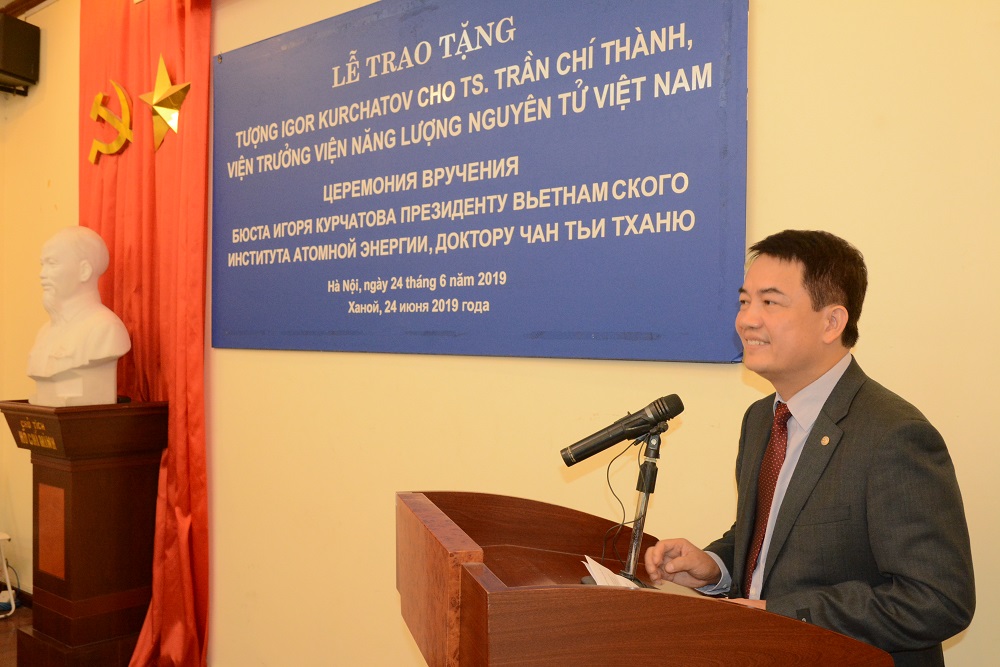
Dr.Tran Chi Thanh, President of the Vietnam Atomic Energy Institute (VINATOM), Ministry of Science and Technology of Vietnam.
WAJ: When being asked about the way to use the old nuclear research reactor,? The reporter mentioned this because when the nuclear reactor for research named Zwentendorf was built, Chancellor Bruno Kreisky voted to allow it to operate, but before 30 minutes, the Austrian public, particularly the press public, 55% of whom disagreed, had to stop the operation. Zwentendorf later became an exhibition. It now becomes a place of European icons. It was not to be used for research on May 25th. They created a memory around that symbol. People debated many issues with that Prime Minister, but after that incident, he was elected and then re-elected for the longest 14 years in history.
The Dalat nuclear research reactor is continuing to function normally for the next ten, fifteen, or twenty years, but once we have a new research reactor, it will be used for training and then as an exhibition. It should not be dismantled but rather cleaned up and turned into an exhibition, in my opinion. The new research reactor will be used to bring applied nuclear technology to life, and it will be a research reactor that is similar to many other nuclear research reactors used for research around the world. They are extremely safe and have no problems. They are all nuclear reactors, which are different compared with Fukushima, which has power reactors for the production of electricity.
WAJ: Could you tell us more about how the IAEA has provided equipment, biological products, and organized training courses on the use of nuclear technology to carry out RT-PCR tests to assist Vietnam in diagnosing and detecting the SARS-CoV-2 virus early, thereby contributing to the recent COVID-19 outbreak?
Vietnam also expressed gratitude to the IAEA for its support of COVID-related equipment. This is a great effort by President of the National Assembly Vuong Dinh Hue and Ambassador Nguyen Trung Kien on this issue, so the IAEA has been very supportive of us on this, and we are very grateful.
In recent years, the IAEA has also assisted itself greatly in terms of human resource training, qualifications, or consultancy regarding the construction of new research nuclear reactor, with the assistance of IAEA experts such as site selection, how to respond to technology, safety assessments, experiences, where to go, or if we invite the world's leading experts to do training, and the IAEA did it. Vietnam thanks the IAEA for this. Ambassador Nguyen Trung Kien also worked hard to improve cooperation with the International Atomic Energy Agency (IAEA).
Laos and Cambodia have recently lagged behind in terms of nuclear science and technology development, so the IAEA intends to dispatch Vietnamese researchers and our capacity to assist Laos and Cambodia in developing this field. Tomorrow, we will have an event between IAEA, Vietnam, Laos, and IAEA, Vietnam, and Cambodia to support further development of nuclear science and technology.
Turning to the Austrian story, nuclear power is a political issue in which populism and science coexist, and we can't listen to people's opinions because some don't understand. However, how they use it politically will be crucial. If they believe in science, they will do things that benefit science and ensure nuclear safety; if they only want to serve the people, that's another story; it's irrelevant.

Minister of Science and Technology Prof. Huynh Thanh Dat and Dr. Tran Chi Thanh moderated the RCA 50th Anniversary Reception Celebration at the UN in Vienna
WAJ: I had a chance to have an interview with former General Director of the IAEA, Yukiya Amano, at the World Policy Conference (2011), who specifically stated at the time that the IAEA would be willing to assist Vietnam in building a nuclear power plant in Ninh Thuan. So how is this work progressing now?
When Mr. Amano was a Director, he traveled to Vietnam and then to Dalat, where he visited the nuclear research reactor. At that time, Vietnam was collaborating with Russia on the nuclear power plant, Ninh Thuan 1, and with Japan on the nuclear power plant, Ninh Thuan 2. However, the National Assembly of Vietnam adopted a resolution to cancel nuclear power plants in November 2016, so there is nothing new so far. However, Mr. Amano's arrival was very positive for the work.
WAJ: How will Vietnam use nuclear technology in interdisciplinary fields such as health, industry, and agriculture?
From my perspective, it is very clear that it is a cancer treatment and diagnosis. Nuclear techniques are used in industry as non-destructive nuclear, using gamma rays to check the quality of equipment and works, assess the potential for equipment failure, and assess the equipment failures of industrial plants such as oil refineries and thermal power plants.
All of this could be accomplished with nuclear technology. In agriculture, we irradiate to quarantine and export a variety of products that we can sterilize with light rays to prevent strange insects from breeding abroad.
Alternatively, we can use those rays to create new radioactively mutated varieties. A genetic mutation is a biological process that results in the creation of a new variety, whereas a radioactive mutation is expected to stimulate the creation of a new variety.
So that's a precaution. Radioactive mutations have resulted in the current products. ST25, for example, has been created and bred for many generations, and applying it to soybeans is another example. Nuclear science is used in the environment to assess marine pollution, the environment, underground water, ect.
Thus, nuclear power is most valued in four areas: medicine, industry, agriculture, and environmental resources.
WAJ: The IAEA values Vietnam's role as the current Chairman in Regional Cooperation Agreement (RCA) on nuclear technology development, particularly training and building capacity for Laos and Cambodia through the triangular cooperation program between Vietnam, the IAEA, and these countries. How will Vietnam carry on this responsibility in the future?
Vietnam will keep boosting this triangular cooperation. The International Atomic Energy Agency (IAEA) is also very supportive, particularly in terms of funding for projects (in the TC context). Vietnam has built a nondestructive capacity assessment center to assist Laos in assessing nondestructive capacity. Laos still wants to use radiation therapy to treat cancer, and capacity must be built. If they want to be treated with radiopharmaceuticals, as in Da lat, Vietnam is willing to help. Da lat has also provided radiopharmaceuticals to Cambodia for cancer treatment, albeit in small amounts, but it has already been done. Cambodia would also like to promote the use of irradiation technology for export. Cambodia has also recently implemented a project. That is, they want to establish a nuclear energy research institute, and Vietnam is collaborating with them to develop a long-term strategy for atomic energy development in Cambodia.

66th Annual General Conference at the United Nations in Vienna
WAJ: The IAEA believes that nuclear technology research is for the purpose of global peace. In light of Europe's current serious energy crisis, what is your take on the IAEA's noble purpose?
I am working on nuclear power safety (the topic of my PhD thesis). That is my area of expertise. In the context of climate change, global warming, and CO2 balance, I believe nuclear energy will be a wise investment in the future. Vietnam is also considering nuclear energy, but that decision is up to the country's leaders, and we are merely technology consultants or scientists. I personally believe that Vietnam will need nuclear energy in the future. We are responsible for accurately assessing the project's safety, technical issues, and implementation capabilities, and the decision is made by the leaders.
We appreciate your efforts to raise public awareness of the critical issues surrounding nuclear power technologies and nuclear safety research. We, like the rest of the world, hope that the dignity of scientists like you will enable the IAEA's noble purpose to be realized in the future.
For more information about the 66th Annual Conference of IAEA, please visit the link: https://www.iaea.org/gc-archives/gc
Thank you very much.
UN in Vienna, 26/9/2023
PROMOTED

ASEAN's 55th anniversary at the United Nations in Vienna - Central Propaganda Department of the Central Committee reported
Dr. Yen Platz- The National Political Publishing House of Truth participates in the 2023 Frankfurt Book Fair
- Chile's Ministry of Foreign Affairs awards WUS with medal to commemorate the 50th anniversary of the coup in Chile
- Musician Jürgen Buch expressed: “I hope Vietnamese music will spread around the world”
- WORLD POLICE TAEKWONDO - MISSION TO MAINTAIN PEACE
- Secretary-General António Guterres: Remarks at Joint Press Conference with the President of Austria, H.E. Alexander Van der Bellen
- Breaking Boundaries: Vietnam's Ancestral Global Day and South Korea join forces for cultural collaboration
- ICI/VAG celebrates and awards scholarships to students of AJC on the anniversary of 60 years of tradition
- Vietnam and America in 1945: A Missed Peace or an Inevitable Divide?
- Young translator conquers the ancient Greek classic Anabasis – Memoir of the Persian Expedition
- Austria news - Usama Nosshy channel covers Asean's 55th anniversary celebrations at the United Nations in Vienna
- VietnamPlus Newspaper reported about ASEAN's 55th anniversary at the United Nations in Vienna
MOST VIEWED
-
1
Happy to create a new path for connecting Korean-Vietnamese Literature

-
2
UNOOSA and University of Bonn renew partnership to advance space-based solutions for disaster management

-
3
Secretary-General António Guterres: This senseless war must stop !

-
4
EMagazin: Vietnam's Role in Strengthening EU-ASEAN Development Cooperation

-
5
Meeting Secretary Blinkenand Minister of Foreign Affairs Bui Thanh Son

The two Kings Philippe and Van der Bellen havedifferent backgrounds, one is of royal origin, and the other is a child of a refugee family (once of noble origin) but now, in the eyes of the European public, both of them are giving off a sense of courtesy, virtue and erudition.
WAJWith the attendance of many international figures, the 80th anniversary of the end of World War II was celebrated at the United Nations headquarters.
Journalist Usama Soliman

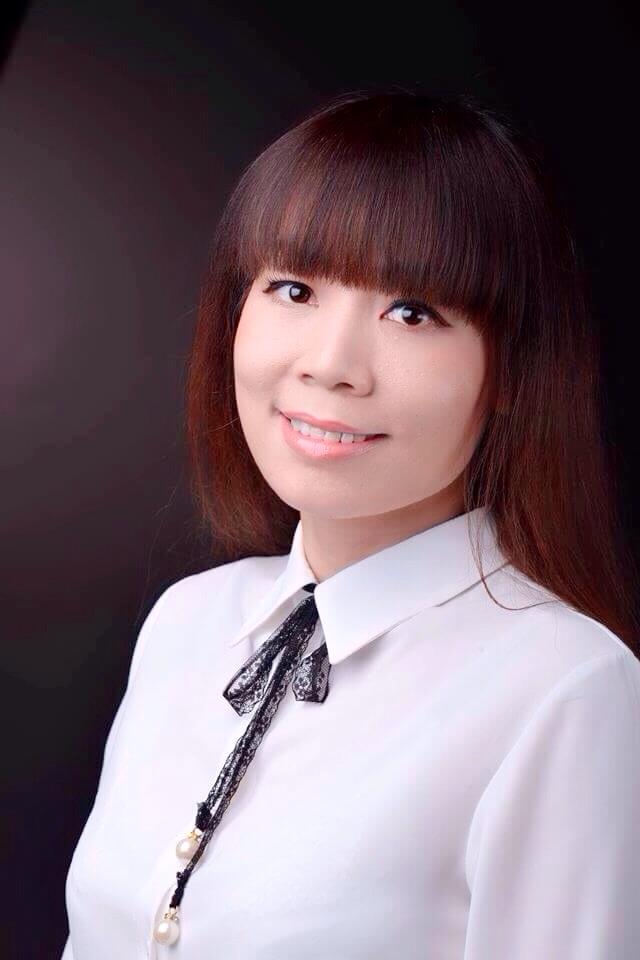
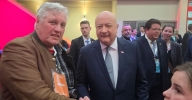
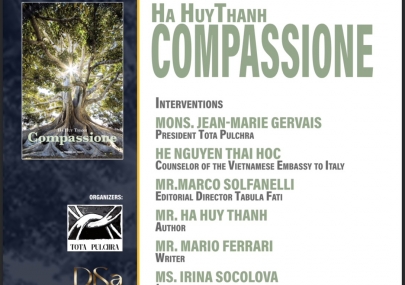
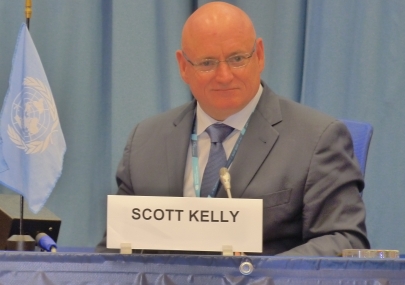
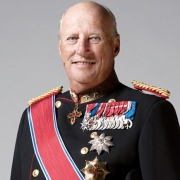
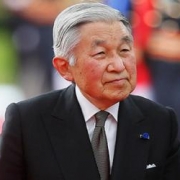
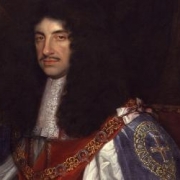
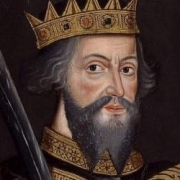



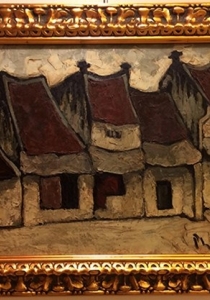

Comment